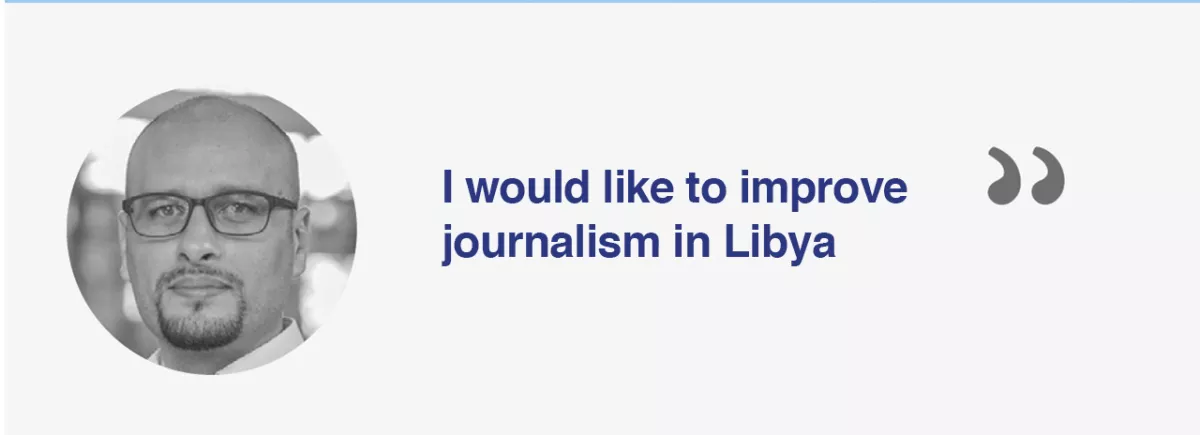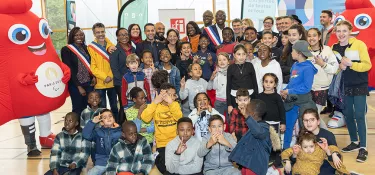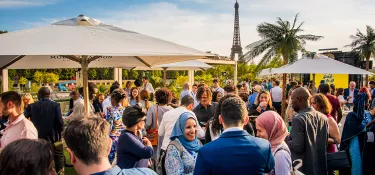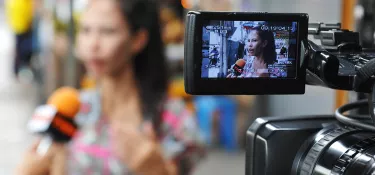
I am a Libyan journalist: Sefyan Khalaf Allah
Related project
HiwarThe words of Sefyan Khalaf Allah, Executive Director of the Libyan Centre for Media Development.
I am Sefyan Khalaf Allah
After the call for positive change in the Libyan revolution of 2011, there was an urgent need to rebuild the country's media industry. For forty years, the media had merely been the promotional tool of an authoritarian, totalitarian system. The system suppressed freedom of the press, freedom of expression and human rights. Rebuilding the media industry and the press is one of the most important aspects of the transitional period towards democracy. There is no democracy without a free, independent media.
Libya's totalitarian era had an enormous impact on the press in general and on journalists as individuals. There is a lack of professionalism in the industry. Moreover, the environment is hostile. Journalists and media workers cannot do their jobs freely and with skill. Laws and regulations that protect and guarantee press freedom and freedom of expression are lacking. The Libyan media industry needs support, so that it can rebuild and restructure, starting from scratch.
This is where my role is. Like every Libyan citizen, I want to strengthen democratic principles and culture in Libya, create stable changes of government, establish the separation of powers, and encourage my fellow citizens to be politically involved, and especially to vote.
I initially worked for the Democracy Support Organisation. Through this NGO, which I founded in late 2011, I was able to take part in a number of educational projects and initiatives on defending human rights, ethnic minority rights and women's independence. We set up a team of 120 volunteer observers of both sexes to monitor the elections to the General National Congress in July 2012.
Like other civil society activists, I faced a lot of challenges and difficulties due to the country's unstable political and security situation. I had to change or even cancel projects on a number of occasions. Nevertheless, these challenges only strengthened my determination and my conviction that my beloved country is going through an extremely important, delicate phase in which every contribution matters, regardless of how small they may be. So I chose to make a contribution to press development, to the reconstruction of this important industry, in order to rebuild a new, free Libya with rule of law and the institutions that uphold it, and to promote the values of tolerance and justice in the transition.
The Media Development Centre was an initiative I started as a national non-profit organisation in 2013, after I had gained experience in media development as executive director of another NGO, the Libyan Media Institute. I was mainly in charge of designing training courses for journalists.
I also worked on designing and carrying out a programme that aimed to enhance the capabilities of six local daily newspapers, in terms of news editing, setting up an editorial team, financial management and human resources.
At the same time, I held a training course for several journalists from different towns around Libya on the media coverage of the national parliamentary elections in June 2014.
My approach to managing training and skills enhancement programmes for journalists is based on sharing experience. The trainers were from abroad and had long-term experience in working in the press in countries transitioning to democracy, such as Libya or the countries of the Arab Spring. The aim of the programmes was to train Libyan journalists to international standards.
However, things changed after the war in the second half of 2014, when Tripoli international airport and the fuel reserves were set on fire. Diplomatic missions were immediately evacuated, as were the international organisations working in various fields, including media development. We couldn't bring international trainers to Libya any more, because of the high risks involved.
I'm used to adapting quickly, so I designed an alternative programme to contribute to the development of the news industry. This involved training freelance Libyan trainers who could then take charge of training their colleagues around the country. I was able to carry out this programme thanks to partnership agreements signed with two international donors, International Media Support (IMS) and the Deutsche Welle Akademie (DW-A). We successfully completed the project in mid-2016.
Diplomas were awarded to thirteen Libyan trainers, who had assiduously followed eight months of training in Tunis with four international trainers sent by our two partners.
I then reached an agreement with IMS for a multi-stage training programme that would give the new Libyan trainers the chance to help train their colleagues around the country. I started in the second half of 2016 by creating a map of the news agencies working around Libya. The aim was to identify potential partners for local journalism training by working in direct collaboration with the journalists' own news agencies. The results of the project showed that the most widespread and stable media providers in Libya were the radio stations. I therefore contacted all of the radio stations that matched our training criteria. A total of 24 stations were designated potential partners.
In December 2016, I managed to sign memoranda of agreement with fourteen local radio stations in eleven towns in the east, west and south of the country. That was stage two.
I'm currently in the middle of the third and final stage, which involves running a project based on the "news content of Libyan local radio stations". It's targeted at 56 radio journalists, who we train on site with two teams of four trainers each, all of whom are graduates of the train-the-trainer programme. It will run from March to April 2017. The programme will help enhance professionalism amongst the journalists and news agencies at whom it's aimed.
In addition, I also take part from time to time in seminars and workshops on consolidating press freedom and freedom of expression. Recently, from January to April 2014, I was able to take part in four seminars that formed part of Hiwar: perspectives on journalism in Libya, a project run by CFI, the French media cooperation agency.
To sum up, I am firmly convinced that more effort is needed from everyone to ensure that the media industry, its people, its institutions and its environment are reconstructed and developed in accordance with modern international press standards. The media need to be free, independent and professional, and they need to contribute to creating civil peace and spreading democratic principles in Libya. There is no democracy without a free, independent media.
In order to sustain democratic debate in Libya, CFI launched Project Hiwar in early 2017 in partnership with the Crisis and Support Centre of the French Ministry of Europe and Foreign Affairs. The project creates a forum for the expression of different points of view on the Libyan press.
One session made up of four workshops was arranged in Tunisia. It was attended by twelve Libyan journalists, who travelled from Libya, Jordan, Turkey, Egypt and Tunisia.
This article forms part of the booklet I am a Libyan journalist, which collects a variety of pieces written by the journalists involved in Project Hiwar.



